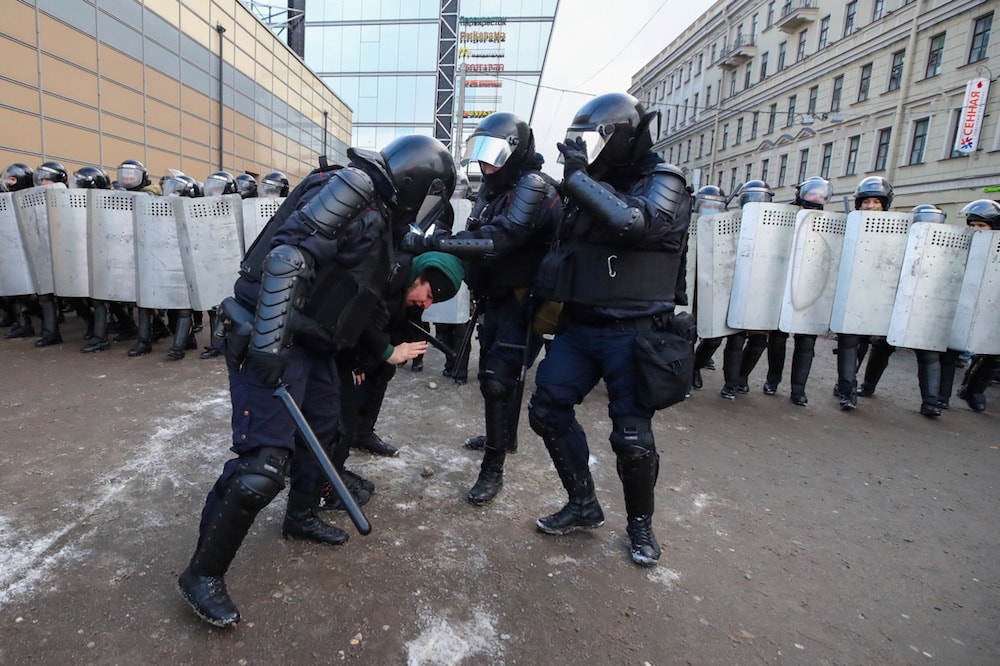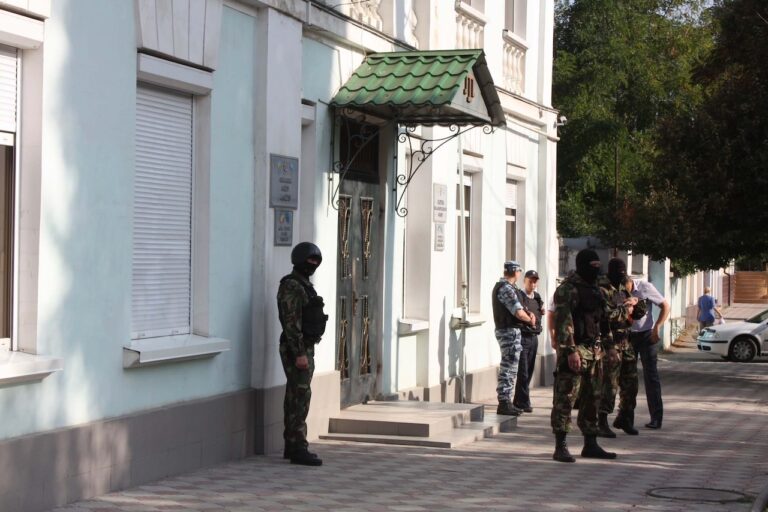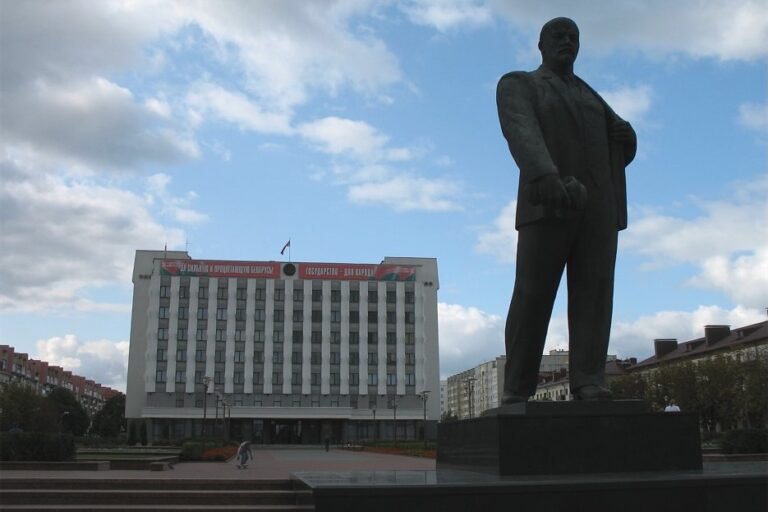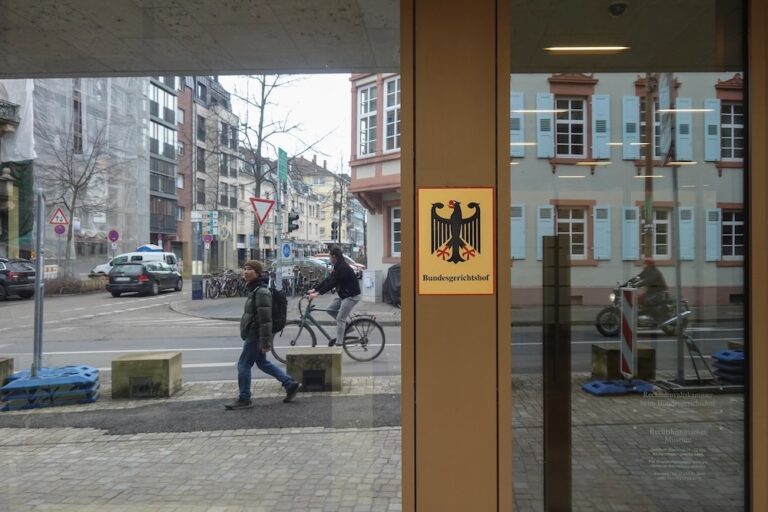January 2021 in Europe and Central Asia: A free expression round up produced by IFEX's Regional Editor Cathal Sheerin, based on IFEX member reports and news from the region.
January saw the arrest of Alexei Navalny spark massive protests across Russia and an incredibly brutal response by the authorities. It saw injustice continuing to flourish in Turkey and another blow against women in Poland. It was also a month of fairytales and aqua discos.
Record numbers arrested at Navalny-inspired protests
Police arrested over 5,000 people – among them more than 80 journalists – and used stun guns on reporters and demonstrators whilst attempting to repress the second wave of anti-Putin protests that swept across Russia on 31 January. The crackdown was significantly more brutal than the previous weekend’s protests (which saw at least 3,700 arrested, including over 50 journalists).
Parallels with the vicious tactics used to crack down on the anti-Lukashenka protests in Belarus were plain to see, from the shocking level of violence directed at unarmed demonstrators, to the multiple detentions carried out by unidentified masked men.
The protests were sparked by the arrest and detention on 17 January of opposition figure, anti-corruption investigator and outspoken Putin-critic Alexei Navalny. The authorities detained him at Moscow’s Sheremetyevo Airport as he returned to Russia after spending five months recuperating in Germany due to his near-fatal poisoning by a nerve agent last August.
The day following his arrest, Navalny, whom Amnesty International has declared a prisoner of conscience, appeared in a makeshift courtroom at a police station outside Moscow. There, true to form, he live-streamed the proceedings, describing them as a “mockery of justice”. UN Special rapporteurs called for his immediate release.
The judge ordered Navalny to be detained for 30 days pending a court hearing regarding alleged breach of parole: if found guilty, he faces up to three-and-a-half years in prison. After the judge announced his decision, Navalny called on the Russian people to take to the streets and protest.
On 23 January, they did just that. In massive demonstrations all across Russia they called for Navalny’s release and for Putin to leave office. Journalist Matthew Luxmoore’s excellent Twitter thread documents these protests:
Calling for street protests while you’re in a courtroom and facing a prison sentence takes guts, but that’s not the only extraordinary thing that happened while Navalny was in court. In the midst of the proceedings, Navalny’s team of anti-corruption investigators released details of an opulent Black Sea palace allegedly being developed as Putin’s private retreat. According to Navalny’s calculations, more than US$1.3 billion of illicit funds have already been spent on it; this money allegedly comes from Putin’s inner circle of billionaires. The Meduza news site spoke to contractors who said that the property boasted numerous “aqua-discos”.
As well as putting his formidable investigative journalism and bravery in the spotlight, Navalny’s arrest also inspired several other Putin-critics to shine a light on some of the more unsavoury aspects of the activist’s views and history.
Navalny is frequently – and very simplistically – depicted as a liberal hero in Western European and North American press. The reality (as it so often is), is much more complicated and problematic. This has led some to feel reticent about showing unqualified support for the man – or at least to want to provide a more nuanced narrative.
In the past, Navalny has espoused nationalist views (saying that Russia should not return occupied Crimea, for instance, and that “illegal immigration” was a far bigger problem); he has flirted with far-right groups and in one video from 2007, he compares immigrants to insects or cockroaches before ‘shooting’ one. At the time of the war between Georgia and Russia in 2008, Navalny called for the deportation of Georgians from Russia. In 2011, his choice of words when describing Muslims in the Caucasus would not have sounded out of place in the mouth of any far-right leader in Europe.
We don’t know to what extent Navalny’s views have evolved, but these positions and opinions range from the deeply troubling to the outright abhorrent.
However, none of this diminishes the importance of his anti-corruption work, or his relevance as a high profile opposition figure and critic of Putin. Neither should it distract from the fact that Navalny’s arrest and prosecution are absolutely politically-motivated, that his rights have been violated on multiple occasions by the Russian authorities, and that he was nearly murdered on Russian soil last year. Indeed, as the BBC’s Moscow correspondent reported, many of the Russians who took to the streets in protest in January were motivated by feelings of resentment towards an authoritarian state abusing its powers (i.e. what Navalny’s case represents) rather than because they were followers of Navalny.
Some interesting, thought-provoking (and perhaps provocative) Twitter threads on Navalny’s arrest, his views, his place in Russian politics and his activism can be found below:
Gender focus
An almost total ban on abortion is now in force in Poland. The government announced on 27 January that it was implementing an October 2020 decision by the Constitutional Court that abortion in cases of severe and irreversible foetal abnormalities is unconstitutional. In Poland, approximately 98% of abortions have been carried out on those grounds. This was yet another blow against women delivered by the ruling Law and Justice Party (PiS), which has been waging a war on women’s sexual and reproductive rights for years. When the Court’s decision was announced last year, it led to huge protests by women’s groups across the country (and an extremely heavy handed response from police in some places). Protesters took to the streets again in late January.
In Hungary, the nationalist government ordered LGBTQI+ group Labrisz to print disclaimers identifying books containing “behaviour inconsistent with traditional gender roles”. This came after Labrisz published an anthology of fairytales – Wonderland Is for Everyone – which includes some stories with LGBTQI+ themes, as well as tales that depict Roma and disabled people in a positive way. Prime Minister Orbán has placed anti- LGBTQ+ sentiment at the centre of his “traditional values” agenda. Last October, when questioned about Wonderland Is for Everyone, he described the book as “homosexual propaganda” and warned that “there is a line you cannot cross”.
The authorities in Turkey are also alarmed by the effects of imaginative literature on children. In early January, the Board of Protection of Minors from Obscene Publications ordered that the children’s book The Magical Rainbow can now only be sold to individuals over 18 years old and that it must be sold in an opaque envelope bearing the message: “harmful for children”. The Magic Rainbow tells the story of a girl and a boy who walk beneath a rainbow that temporarily changes their sex (to which they later revert back). According to the authorities, the book might encourage “gender change” and a questioning of “sexual identity”, and thus it “has the potential to harm children’s mental and emotional health and balanced development and have a detrimental effect on their personal development and spiritual well-being”.
IIHF punishes Lukashenka, an international day of solidarity
In Belarus, the popular protests against President Lukashenka’s regime continue, as do the arrests and harassment of the independent press and activists. IFEX members highlighted three cases of detained writers or journalists this month: translator Volha Kalackaja, detained for supporting the peaceful protests; journalist Andrei Aliaksandrau, detained for allegedly organising mass protests; and journalist Ihar Losik, accused of organising “mass riots” and currently on hunger strike.
Lukashenka’s propaganda machine suffered a blow in January when the International Ice Hockey Federation (IIHF) axed Belarus as one of the two hosts of the world championship scheduled to take place in May and June. Cancelling the events in Minsk was one of the requests made by the European Federation of Journalists when it wrote to the IIHF’s president, René Fasel, earlier in the month. Fasel had seemed reluctant to punish Belarus, but businesses sponsoring the tournament began to withdraw fearing bad publicity: money obviously talks.
Exiled opposition leader Sviatlana Tsikhanouskaya has declared a Day of Solidarity with Belarus on 7 February, providing rights organisations with a useful date around which to coordinate advocacy.
Please check out PEN Belarus’s new report on the persecution of the cultural sector. According to their findings, at least 500 individuals working in this sector have had their rights violated by the authorities in 2020.
New and noteworthy
An appeals court in Turkey overturned the February 2020 acquittal of nine people, including civil society leader Osman Kavala, who were charged with “attempting to overthrow the government” during the 2013 Gezi Park protests. Kavala has been behind bars since 2017 and is currently on trial on separate coup-related charges. The European Court of Human Rights has ruled that he should be released from jail.
Three key rights groups in Kazakhstan have been suspended by the authorities over dubious claims of “financial irregularities”. The Kazakhstan International Bureau for Human Rights and Rule of Law, International Legal Initiative, and Echo (an election-monitoring group) each received three-month suspensions. According to Human Rights Watch, the “tax authorities’ claims pertain solely to regulations around how these organizations report the receipt and expenditure of foreign funding to support their activities”.



